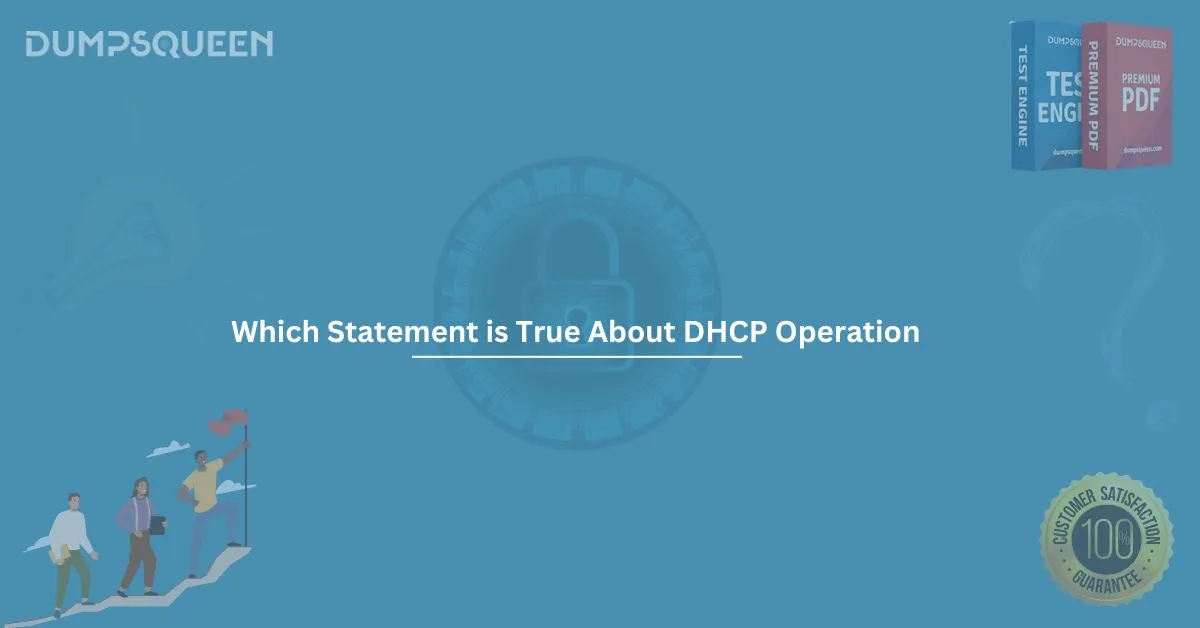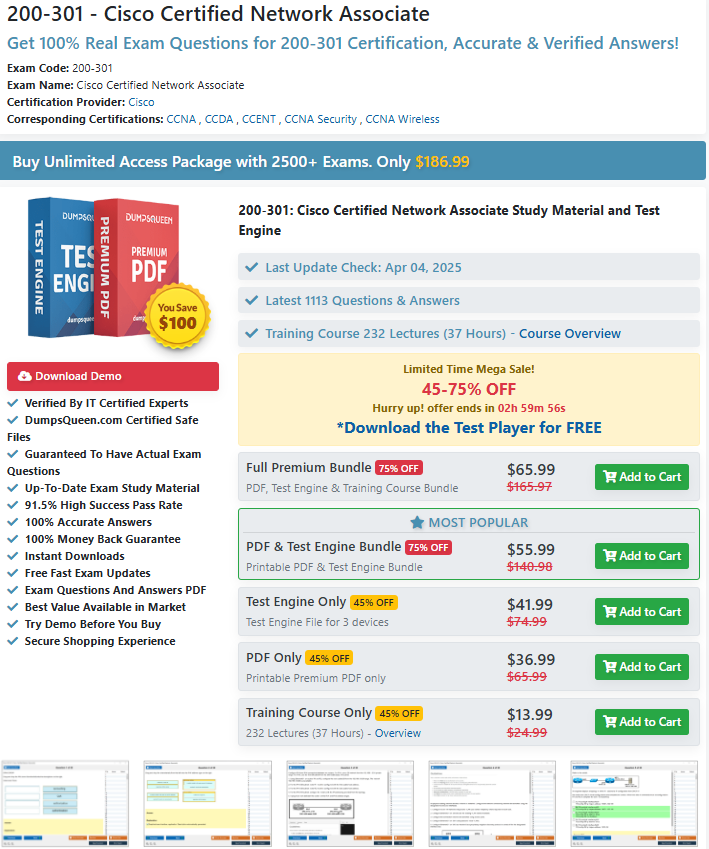Understanding DHCP: A Comprehensive Guide for Cisco CCNA 200-301 with DumpsQueen
Brief Introduction to DHCP (Dynamic Host Configuration Protocol)
In the ever-evolving world of networking, efficiency and automation are key to managing complex systems. One of the unsung heroes in this domain is the Dynamic Host Configuration Protocol (DHCP), a network management protocol that automates the assignment of IP addresses and other configuration parameters to devices on a network. Imagine a busy office with hundreds of devices—laptops, phones, printers—all needing unique IP addresses to communicate. Manually assigning these addresses would be a nightmare for any network administrator. That’s where DHCP steps in, simplifying the process and ensuring seamless connectivity. For those preparing for the Cisco Certified Network Associate (CCNA) 200-301 exam, mastering DHCP is not just a requirement—it’s a gateway to understanding modern network operations. In this blog, we’ll explore DHCP in depth, its relevance to the CCNA 200-301 exam, and how DumpsQueen can be your ultimate companion in acing this certification.
Understanding DHCP
DHCP is a client-server protocol that dynamically assigns IP addresses to devices, eliminating the need for manual configuration. It operates on the principle of leasing IP addresses for a specific period, allowing devices to join and leave networks without causing conflicts. At its core, DHCP ensures that every device on a network has a unique IP address, subnet mask, default gateway, and often additional details like DNS server addresses. This automation reduces administrative overhead and minimizes errors, such as duplicate IP assignments.
The protocol was developed to address the limitations of its predecessor, BOOTP (Bootstrap Protocol), offering greater flexibility and scalability. Today, DHCP is a cornerstone of both small home networks and large enterprise systems. For CCNA aspirants, understanding DHCP is critical because it ties into broader networking concepts like IP addressing, subnetting, and network troubleshooting—all of which are tested in the 200-301 exam.
Key Functions of DHCP
DHCP performs several vital functions that make it indispensable in networking:
- IP Address Assignment: DHCP automatically assigns IP addresses from a predefined pool, ensuring each device has a unique address to communicate on the network.
- Lease Management: IP addresses are leased to devices for a set duration (e.g., 24 hours or 72 hours). Once the lease expires, the address can be reclaimed or renewed.
- Configuration Distribution: Beyond IP addresses, DHCP provides additional parameters like subnet masks, default gateways, and DNS server addresses, ensuring devices are fully configured to operate.
- Efficient Resource Use: By dynamically managing IP address pools, DHCP prevents wastage and allows networks to scale efficiently.
- Support for Multiple Subnets: Through DHCP relay agents, the protocol can assign addresses across different subnets, making it versatile for complex network topologies.
These functions highlight why DHCP is a must-know topic for the CCNA 200-301 exam, as they underpin network automation and connectivity—key areas of focus in Cisco’s certification.
Exam Focus: Key Concepts for 200-301
The Cisco CCNA 200-301 exam emphasizes a broad range of networking fundamentals, and DHCP is a prominent topic within the "Network Fundamentals" and "IP Services" domains. Here are the key DHCP concepts you need to master:
- DHCP Operation: Understand the four-step process (DORA: Discover, Offer, Request, Acknowledge) that governs how devices obtain IP addresses.
- DHCP Roles: Differentiate between DHCP clients (devices requesting addresses) and DHCP servers (devices assigning addresses).
- DHCP Relay: Learn how relay agents enable DHCP communication across subnets, a common scenario in enterprise networks.
- Troubleshooting: Be prepared to identify and resolve DHCP-related issues, such as lease conflicts or server unavailability.
- Configuration: Know how to configure DHCP on Cisco devices, including setting up address pools and relay agents.
These concepts are not just theoretical—they’re practical skills tested through simulations and multiple-choice questions in the exam. DumpsQueen provides targeted resources to help you grasp these ideas, offering practice questions and explanations tailored to the 200-301 syllabus.
Common DHCP Operation Statements
When studying DHCP for the CCNA, you’ll encounter statements about its operation. Let’s evaluate some common ones to clarify what’s true:
"DHCP automates IP address assignment." True. This is the protocol’s primary purpose, reducing manual effort.
"DHCP uses UDP ports 67 and 68." True. The server listens on port 67, and the client uses port 68 for communication.
"DHCP assigns permanent IP addresses." False. DHCP leases addresses temporarily, though leases can be renewed.
"DHCP relay agents are required for every subnet." False. Relay agents are only needed when the DHCP server is on a different subnet from the client.
"DHCP can provide DNS server details." True. It’s a common additional configuration parameter.
Understanding these statements is crucial for answering exam questions accurately. DumpsQueen excels here by offering practice exams that test your ability to distinguish between true and false DHCP-related claims, ensuring you’re well-prepared.
DHCP Packet Flow
The DHCP process follows a four-step sequence known as DORA:
- Discover: The client broadcasts a DHCPDISCOVER message to locate a DHCP server. It uses a source IP of 0.0.0.0 (since it has no address yet) and a destination IP of 255.255.255.255 (broadcast).
- Offer: The DHCP server responds with a DHCPOFFER, proposing an IP address and configuration details. This is typically a unicast message to the client’s MAC address.
- Request: The client broadcasts a DHCPREQUEST to formally request the offered IP address, informing other servers (if present) to withdraw their offers.
- Acknowledge: The server sends a DHCPACK to confirm the lease, finalizing the assignment.
This packet flow is a favorite topic in the CCNA 200-301 exam, often tested through diagrams or troubleshooting scenarios. With DumpsQueen, you’ll find interactive tools and simulations to visualize this process, making it easier to retain and apply during the exam.
Troubleshooting DHCP Issues
DHCP isn’t flawless—issues can arise, and the CCNA expects you to troubleshoot them. Common problems include:
- No IP Assignment: The client might not receive an address if the server is down, the pool is exhausted, or broadcasts aren’t reaching the server (e.g., no relay agent).
- IP Conflicts: Duplicate addresses can occur if static assignments overlap with the DHCP pool.
- Lease Expiration: Clients may lose connectivity if they fail to renew their lease.
- Misconfiguration: Incorrect subnet masks or gateway settings can disrupt communication.
To troubleshoot, verify server status, check pool availability, ensure relay agents are configured (using Cisco’s ip helper-address command), and review logs. DumpsQueen offers scenario-based questions that mimic these issues, complete with step-by-step solutions, preparing you for the exam’s practical components.
Exam Tips for the 200-301
Acing the CCNA 200-301 exam requires strategy, especially for DHCP-related topics. Here are some tips, amplified by DumpsQueen’s resources:
- Master the Basics: Memorize the DORA process and port numbers (UDP 67/68). DumpsQueen’s flashcards make this a breeze.
- Practice Configurations: Use Cisco Packet Tracer to set up DHCP servers and relay agents. DumpsQueen provides lab exercises to complement this.
- Tackle Troubleshooting: Focus on common DHCP failure points. DumpsQueen’s practice tests include real-world scenarios to hone your skills.
- Time Management: The exam is time-bound. DumpsQueen’s timed quizzes help you build speed and accuracy.
- Review Explanations: Don’t just answer questions—understand why. DumpsQueen’s detailed breakdowns ensure you learn from every attempt.
With DumpsQueen, you’re not just studying—you’re training to think like a Cisco professional, which is exactly what the 200-301 demands.
Conclusion
DHCP is more than a protocol—it’s a lifeline for network efficiency, and understanding it is a non-negotiable for the Cisco CCNA 200-301 exam. From its role in IP assignment to its packet flow and troubleshooting, DHCP encapsulates the practical skills Cisco expects from certified professionals. Whether you’re deciphering exam questions or configuring a router, a solid grasp of DHCP sets you apart.
This is where DumpsQueen shines. With its comprehensive study materials—practice exams, detailed explanations, and hands-on simulations—it’s the perfect partner for your CCNA journey. Unlike generic resources, DumpsQueen tailors its content to the 200-301 syllabus, ensuring you focus on what matters. It’s not just about passing the exam; it’s about building confidence and competence for a networking career.
As you prepare, let DHCP be your stepping stone to success, and let DumpsQueen guide you there. With dedication and the right tools, that CCNA certification is within reach. Happy studying, and may your networks always stay connected!
Free Sample Questions
Which statement is true about DHCP operation?
a) DHCP is a protocol that assigns static IP addresses to devices.
b) DHCP assigns dynamic IP addresses to devices on a network.
c) DHCP is used only for DNS configuration.
d) DHCP requires manual configuration on every device.
Answer: b) DHCP assigns dynamic IP addresses to devices on a network.
What is the primary role of a DHCP server in a network?
a) To store the IP addresses of all devices in a network.
b) To assign IP addresses automatically to clients when they connect.
c) To manage network security and prevent unauthorized devices from joining.
d) To provide a centralized location for domain names and host names.
Answer: b) To assign IP addresses automatically to clients when they connect.
What happens if a DHCP client cannot receive an IP address from a DHCP server?
a) The client will automatically assign itself an IP address.
b) The client will not be able to communicate with any other devices.
c) The client will shut down until a DHCP server is available.
d) The client will be assigned a static IP address.
Answer: a) The client will automatically assign itself an IP address.
Which of the following DHCP messages is sent by a client to request an IP address from a DHCP server?
a) DHCP Discover
b) DHCP Request
c) DHCP Offer
d) DHCP Ack
Answer: b) DHCP Request
How does a DHCP server prevent assigning the same IP address to two devices?
a) It uses a dynamic IP allocation algorithm.
b) It assigns the same IP to all devices to simplify configuration.
c) It keeps track of assigned IP addresses in a DHCP lease table.
d) It requires manual entry of device MAC addresses.
Answer: c) It keeps track of assigned IP addresses in a DHCP lease table.




